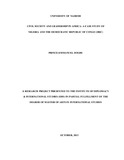| dc.description.abstract | ABSTRACT
This study sought to investigate a key role of the civil society for the emergence of
quality leadership in Africa in general and in Nigeria and DRC in particular. A
descriptive and explorative research design had been used to guide critical analysis of
existing secondary documents and primary data and situate the role of the civil society in
Africa’s desire for a quality leadership and governance era, with specific case studies
covering Nigeria and DRC. The findings suggest that individuals and groups, as the
backbone and actors in civil society, should design strategies that are inherently
democratic and transparent as a prerequisite to effective action. A transparent and
democratic civil society can play an important role as watchdogs to ensure governments
are accountable and fulfill their commitments. By insisting on transparent development
strategies, the civil society can actively engage in policy making and implementation. As
advocates of policy change and analysis, they can play an even greater role in ensuring
accountability and transparency, openness and responsiveness, while building social
capital, enabling citizens to identify and effectively articulate their values, civic norms,
and democratic practices. The civil society is an important agency in the mobilization of
constituencies, such as the vulnerable and marginalized in the society, and encouraging
them to fully participate in politics and public affairs. The study concludes that the civil
society is an integral actor and partner in development. A strengthened and focused civil
society can create an environment that nurtures quality leadership practices and upholds
sound democratic principles. It is only then that leaders can steer Africa to social,
economic, and political prosperity. | en |

